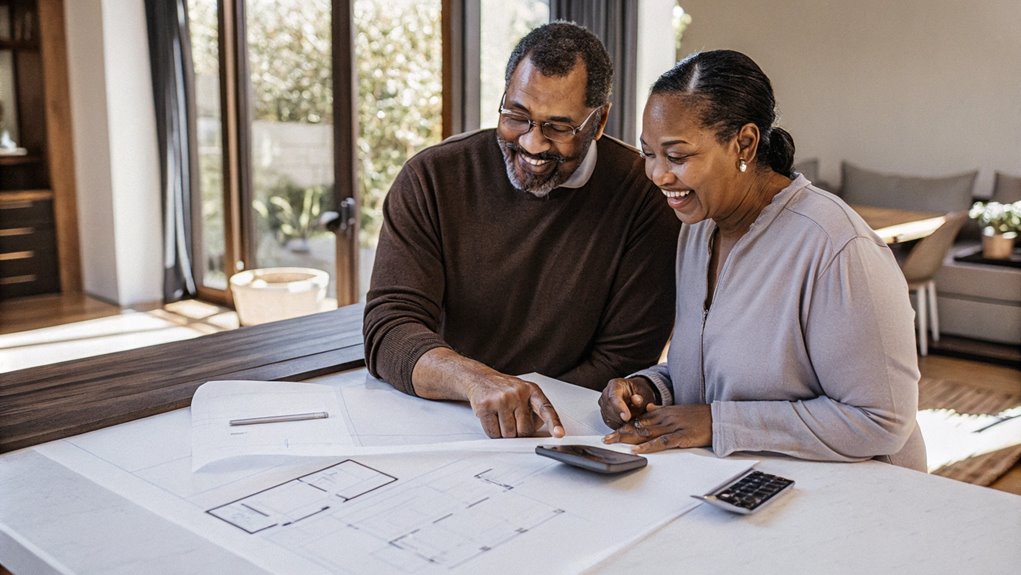Your home is like a piggy bank that grows over time. Before you break into it, make sure you have some money saved up – enough to cover 3-6 months of bills. Think hard about what you want to use the money for. Good reasons include fixing up your home, paying off big debts, or investing in something that will make you more money later. Don't use it for fun stuff like trips or fancy things.
You can get money from your home in three ways. You can get a home loan, a line of credit, or get cash by redoing your mortgage. Pick the one that fits your needs best and that you can pay back easily.
Always keep at least 20% of your home's value untouched. It's like a safety net. Make a plan to pay back what you borrow. This will help you stay on track with your money goals. When you use your home's value the right way, you can build more wealth over time.
Understanding Home Equity Basics

Your home equity is the part of your home you really own. Think of it like this: if your home is worth $200,000 and you owe $150,000 on your loan, you have $50,000 in home equity.
You build equity in two ways. First, when you pay your monthly bill, you own a bit more of your home. Second, when your home goes up in value, your equity grows too.
Your home equity can go up or down. It depends on how much you pay each month and what homes are selling for in your area.
When you pay your loan each month, more of your money goes to owning your home over time.
The more equity you have, the more money you might be able to borrow. It also shows how well you're doing with your money.
Evaluating Your Current Financial Position
Before you use your home's money, you need to check if you can afford it. Look at how much you owe and how much you make each month. Check your credit score too. Make sure you can pay your bills on time.
Save some money first. Keep enough to pay for three to six months of your bills.
Look at your home loan to see what you pay now and how much you still owe. Think about your job – is it steady? Will you make more money later? This matters when you want to borrow more.
See if you saved enough for when you stop working. Think about what you want to do with your money in the years ahead.
If you don't have enough saved up, using your home's money might hurt you later.
Smart Uses for Home Equity

Your home is like a piggy bank. When you own it for a while, it grows in value. You can use this value in smart ways.
The best way to use this money is to make your home better. You could fix up your kitchen or add a new room. This makes your home worth more money.
If you have lots of bills with high costs, you can use your home's value to pay them off. But first, make sure you won't get into debt again.
You can also use the money to learn new skills or start your own work. These choices can help you earn more money later.
Don't use your home's value for fun things like trips or fancy stuff. When you use this money, you're taking it from your home.
Make sure what you do with it will help you save or make more money in the long run.
Common Home Equity Mistakes
Taking money from your home can help you pay for things, but you need to be smart about it.
Don't borrow too much money at once. Know how much your home is worth right now.
Take good care of your home to keep it nice. If you make these mistakes, you might end up owing more than your home is worth.
This could make it hard to pay your bills and hurt the value of your home.
Borrowing Too Much Money
Taking out too much money on your home can hurt you and your family. When banks say you can borrow a lot of money from your home's value, it may feel like free cash. But it's not free – you have to pay it all back.
Look at how much money you make each month. Think about what you want to do with your money in the years ahead. Your home is on the line when you borrow against it. If you can't pay back the loan, you could lose your house.
Keep at least 20% of your home's worth for yourself. Only take what you know you can pay back soon. House prices go up and down, so be smart about how much you borrow.
Ignoring Market Value Changes
Your house is worth money today, but that can change tomorrow. Many people think their home will always be worth the same amount. This is a big mistake when borrowing money against your home.
Your house can lose value when the economy is bad. It can also drop if your street gets run down or your house needs fixes. If this happens, you might owe more than your house is worth.
Keep an eye on home prices in your area. Look at how prices went up and down in the past. Don't borrow too much just because house prices are high right now.
Play it safe. Borrow less than your house is worth. This way, if home prices fall, you'll still be okay.
Think about what your house might be worth later, not just what it's worth today.
Skipping Essential Home Maintenance
Taking care of your home is like taking care of a friend. When you skip basic home care while using home equity, you hurt both your house and your loan.
Your house needs love and care to stay strong. Fix leaky roofs right away. Keep your heating and cooling systems running well. Fix broken pipes fast. Get rid of bugs and pests. These jobs might seem small, but they matter a lot.
If you ignore these tasks, your house can get sick. A sick house loses value fast. When your house loses value, you could end up owing more money than your house is worth.
Banks want to see that you take good care of your house. If you don't, they mightn't want to give you more money later when you need it.
Comparing Different Borrowing Options

Let's talk about ways to borrow money from your home. You worked hard to build value in your home, and now you can use it to get money when you need it.
You have three main choices:
First, you can get a home equity loan. This is like getting a fixed amount of money all at once. You know how much you'll pay each month, which helps with planning.
Next, there's a home equity line of credit. Think of it like a credit card that uses your house for backup. You can take money when you need it and pay it back over time.
Last, you can redo your whole home loan to get cash back. This might save you money if you can get a better rate on your loan.
Before you pick one, think about:
- How much it will cost
- How much you'll pay each month
- If it will help with your taxes
- How long you'll take to pay it back
Just remember: your house is on the line with any of these choices. Make sure you can pay the money back before you borrow.
Calculating Risk Vs Reward
Think about using your home's money like a piggy bank.
First, do some simple math. Will you make more money than what you spend on fees and costs?
Look at how much you'll pay each month. Ask yourself if you can handle losing some money if things don't work out as planned.
Keep enough cash saved up so you can still pay your bills and keep your home safe.
When you do this math, take your time and be honest with yourself about what you can really afford.
Breaking Even: Worth It?
Breaking Even: Is It Worth It?
When you borrow money from your home, you need to think about if it will help you in the long run. This means looking at what you pay now and what you might get back later.
Think about these costs:
- Fees to start the loan
- New monthly bills
- How much your home might be worth after changes
If you want to fix up your home, make sure the new things you add will be worth more than what you spend.
Try to make back your money within five years. Keep in mind that home prices and loan costs can go up or down over time.
Sometimes using your home's value makes sense, but only if the math works out in your favor.
Look at all the numbers before you decide.
Losses You Can Handle
Your home is like a piggy bank that keeps you safe. Be careful not to break it open unless you really need to.
First, think about how much money you could lose and still be okay.
Look at how much you make and spend each month. Count your savings. Think about your bills. Keep enough money in your home in case house prices go down. House prices can drop by a lot – sometimes 20-30%.
Think about your job. Is it safe? What about health costs? Are there big things coming up in your life that need money?
A good rule is to keep 20% of your home's worth safe. This way, if prices drop, you won't owe more than your home is worth. It also helps you save money on insurance and get better loans later.
Protecting Your Home's Value

Your home is like a piggy bank – it's worth money and you want it to stay that way. Here's how to take care of it:
Keep your home in good shape by fixing things when they break. Look after:
- Your heating and air units
- Your pipes and wires
- Your roof and walls
- Your yard and how your house looks from the street
Look at what other homes near you sell for. This tells you what your home might be worth.
Pay attention to what's new in your area, like:
- New stores or parks
- How good the schools are
- Changes in your neighborhood
Talk to someone who sells homes. They can tell you what fixes will make your home worth more money in your area.
Remember: A well-kept home is worth more than a home that needs lots of work. Small fixes now can save you money later.
Building Emergency Reserves First
You should save money before using your home's value as cash.
Put away enough money to cover 6 months of bills and daily costs. Keep this money in a bank where you can get it fast.
Having this money saved will help you when times get tough. You won't need to use your house to pay for sudden costs.
This keeps your home safe.
Save Before Tapping Equity
Your home is like a piggy bank. But before you break it open, you need to be smart about it.
First, save up some money. Put away enough cash to pay your bills for 3-6 months. This is your safety net if things go wrong.
Next, make a plan to pay off any big debts you have. Focus on the ones that cost you the most in interest.
Then, save at least 20 cents of every dollar you make. Do this every month without fail.
When you have these things in place, you mightn't need to use your home's value at all. But if you do, you'll be ready. You'll be able to handle the new debt and keep your money safe.
Remember: Your home is too important to risk without having a safety plan first.
Prioritize Six Month Buffer
Keep your money safe by saving six months of living costs before you think about using your house for loans.
Think about what you spend each month on your home, power bills, food, and staying healthy. Take that number and times it by six. This money helps protect you when tough times come.
Having this money saved means you won't need to use your house to get cash when things get hard. Many people skip saving and end up in trouble when they stop getting paid.
Your saved money acts like a safety net. It helps you make better choices and keeps your house safe. Then you can use your house's value for good things, like fixing up your home or paying for school.
Setting Clear Repayment Strategies

Taking out money from your home means you need a good plan to pay it back. Think about how you'll pay the money each month, just like you plan your other bills.
Make your plan work by:
- Looking at how much you make and all your bills now. Then check if you can handle the new loan payment too.
- Setting up your bank to pay the loan on the same day you get your paycheck.
- Making small goals to pay off chunks of the loan, and watching how you do.
Keep your payments at a size you can handle each month. This way, you won't worry about paying back the loan.
Maintaining Financial Flexibility
Your home is like a piggy bank – you want to keep enough money in it for when you need it. Try to keep at least 20% of your home's value saved up. This helps you avoid extra fees and gives you room to borrow if you need to.
Don't use up all your home's value at once. Think about getting a special credit line from your bank that uses your house as backup.
Keep some cash in the bank too. This way, you have many ways to get money when you need it.
Look at how much your house is worth every few months. Make changes to your plan when house prices go up or down, or when your life needs change.







